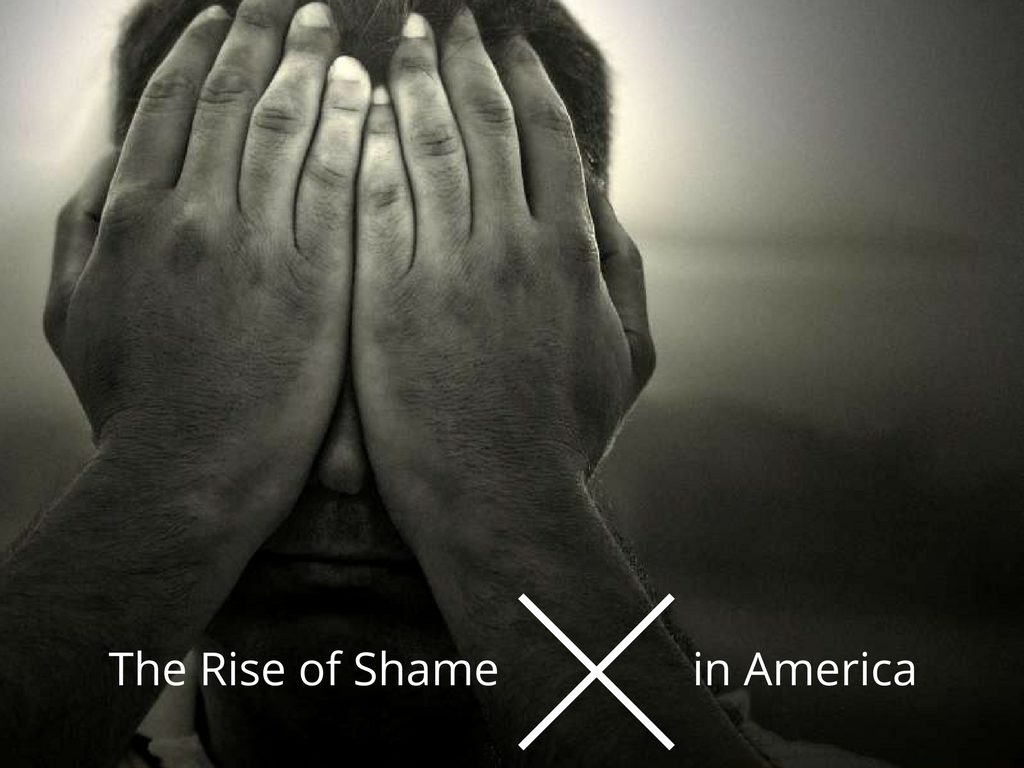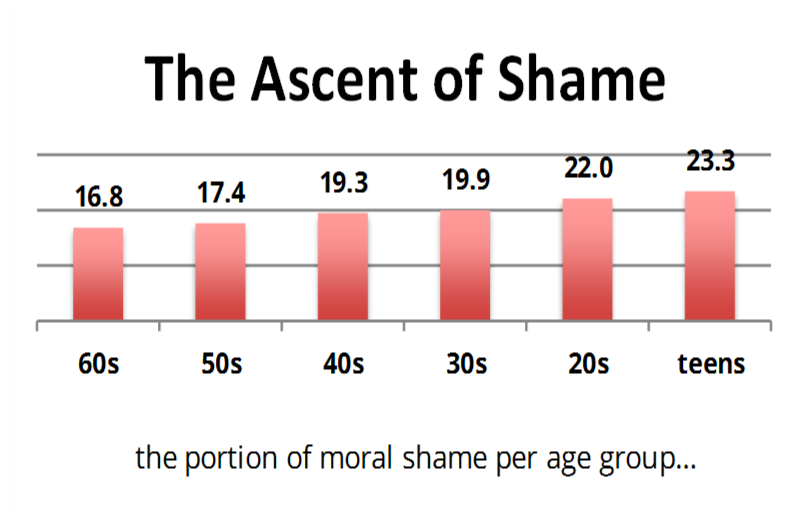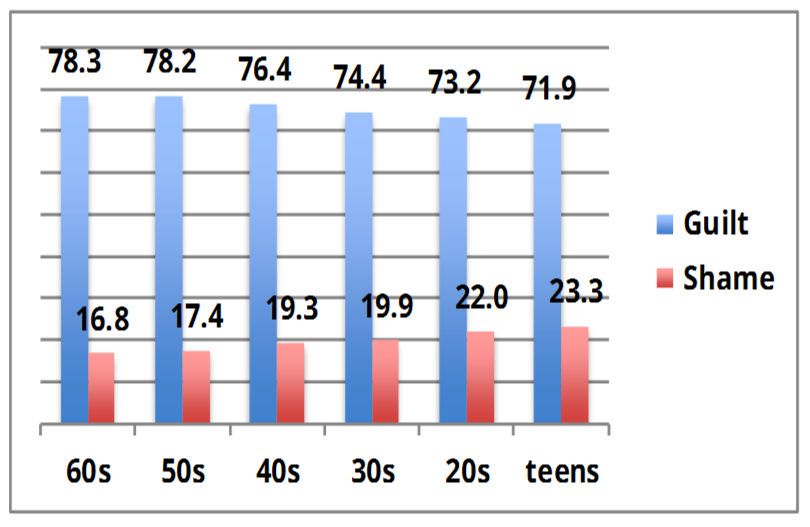The Rise of Shame in America
Younger people in the West are becoming more sensitive to shame.
Western culture as a whole, not just particular segments, appears to be shifting from guilt and toward shame. The Christianity Today cover article “The Return of Shame” noted how “shame is becoming a dominant force in the West.” This observation is not entirely new. In 1946 Ruth Benedict, the WWII anthropologist who popularized the “West=guilt; East=shame” distinction, observed, “But shame is an increasingly heavy burden in the United States and guilt is less extremely felt than in earlier generations.”
Is The West Becoming More Shame-Prone?
But, is this observation true? Yes. Data from TheCultureTest.com collaborates that shame is becoming a more dominant factor among younger people. The chart below shows how shame increases as age decreases.
This data is based all the respondents of TheCultureTest.com who self-identified as “anglo.” The vast majority were American, though some were Canadian and European. Then I separated those “anglo” respondents into age groups by decade. The sample size was significant; each age group had 500 responses (except “teens,” which had only 75 results). The height of each bar (y-axis) represents the average percentage for moral shame in each age group.
The chart below includes the average scores for guilt, which decreases at the same rate that shame increases.
Average Scores for Guilt
Much like the results for global cultures (see infographic), these figures merely confirm what people have long suspected—among younger Westerners, guilt is less prominent and shame is more prevalent. The amount of moral shame among teens (23.3) is 38% greater than among people in their 60s (16.8).
Considering how often I hear people claim, “young people are becoming more shame based,” I actually expected a greater difference between boomers and millennials. There are reasons why the gap is not more pronounced.
Explanations
- Older generations had less “relational mobility,” referring to the general degree to which individuals in the society have the opportunities to form new relationships. A psychological study concluded that low relationship mobility predicts shame proneness. People who can’t leave a social group are more concerned about their existing reputation, so they are more prone to feel shame.
Considering this factor for shame proneness, one would expect older generations (people raised in the 1950s, with lower relationship options) to be more shame prone than young generations (people raised in the 1990s with high relationship mobility). Relationship mobility does influence shame proneness, but it does not define shame-proneness. There are other factors.
- I wonder how well TheCultureTest.com captures the shame of younger people. The honor-shame option for each question on TheCultureTest is geared toward traditional notions of honor and shame. I designed the survey to assess global culture types, not Western subcultures. However, the moral shame experienced by Westerners below the age of 30 is unlike traditional honor-shame cultures. Andy Crouch explained,
“So instead of evolving into a traditional honor–shame culture, large parts of our culture are starting to look something like a postmodern fame–shame culture. Like honor, fame is a public estimation of worth, a powerful currency of status. But fame is bestowed by a broad audience, with only the loosest of bonds to those they acclaim.”
So people under 30 years old could be more influenced by shame more than the results indicate, mostly because the questions and answers of TheTestCulture.com fail to pick up the unique type of shame emerging in Western culture. (See Five Types of Shame Cultures).
Why is America becoming more shame prone? The next post will explain five reasons.




My impression is that shame is being used to build consensus world wide for the One World Government. It is actively taught in school classrooms and recent movies, for instance. This is relatively new phenomenen which is why it is most prevelent in the younger people.
The increasingly shame based ideas have been a subject I have taught on for some time. IMO, it has several reasons.
1. The Post Modern writers have no premise of right and wrong basd on a moral or ethical standard. Thus, there are no standards and no True Moral Guilt.
2. This means that “Everyone did what was right in his own eyes” but society cannot live that way so standards grew up around what we call “Politically Correct Ideas” such as race, gender, etc. When such rules are seen to be violated the violator must be expelled from the Pro PC Society. Refuse to bake a cake for gays and you will be expelled from the group.
3. Public humiliation replaces legal punishment. In Communist China violaters were driven around the square in an open truck to be shamed before they were killed. Here shaming occurs on social media and mobs demand offenders be fired, shamed by ugly photos, their goods and services withdrawn from the market, etc. PC leaders rail against them in public places like plays and musicals.
There is no “Legal Crime” but a social stigma.
4. In the end the sub groups will destroy each other. It is happening right now. The “Women’s March” is being attacked and shamed because they promoted the idea that every woman must have a vagina. This is very offensive to the gender police who say that a person with male genitls but who self-identifies as a female is just as much a woman as anyone born with female genitals. Every Shaming Group will get smaller and smaller until every variety shames every other variety.
Friends-
Thank you for your continued work in familiarizing myself and many others with the cultural dynamics of guilt-shame-fear operating within and between cultures. You have provided me with useful terms to engage both my parishioners and my family in talking about how we can become more like the body of Christ described in Scripture as we see guilt-shame-fear in our own town – yes, we see all three here.
I have little doubt of your assertion that 21st century America is exhibiting more honor-shame over against guilt but this conclusion is borne out by measuring the behavior of a culture in terms of its media, politics, economics, and justice compared with its past media, politics, economics, and justice. Such a change is not a necessary conclusion from the data presented that the young people of today are any more or less shame based than in previous generations.
What your data does suggest is that relative to older Americans young people are more influenced by shame. In order to draw the conclusion that American culture is shifting toward shame and away from guilt the data would have to measure longitudinally cadres to see if there was change over time. With what is presented above you could just as well say that older Americans have learned how to suppress and rationalize the consequences of their behavior in terms of guilt to minimize their emotional experience of shame.
Again, I appreciate your work, especially the video illustrations and infographics. Your thoughtful distinctions cause me to look more closely at our culture through the lens of God’s own criteria rather than my own or the biases I inherited.
David,
Thanks for your encouraging word.
You are certainly correct that an longitudinal study would provide a more complete explanation, and that we should not over-interpret the numbers. I agree that the best “data” proving the rise of shame in Western culture is soft, cultural data (stories, trends, movies, headlines, etc.). Since many people observe that, they often ask me about the results of The Culture Test regarding age demographics–so I compiled the data into a simple post so that people have a simple answer.
The results of The Culture Test never define a culture. It would be silly to reduce the complexities and nuances of “culture” (as though that is even a monolithic, easily-defined entity) down to a number…”America is 23% shame.” Info from TheCultureTest.com is only one piece of the puzzle.
Yes, perhaps the correct conclusion of those numbers is that people become more guilt based as they age–a conclusion dealing more with developmental psychology than cultural shifts. The data doesn’t answer this issue (since TheCultureTest was only developed 2 years ago, so a longitudinal study is not yet possible, but perhaps in 50 years!). But I must say, I have never encountered any research or even claim that people change moral paradigms as they age (the developmental psychology case)…and well, cultures does seem to be noticeably shifting (even if there are not statistics to prove it).
Thanks again for the comment, they help process the meaning and implications of the information. Peace, Jayson
I was thinking the same thing as David. I know I was more affected by shame when I was a teenager. I wonder if these current teens will stay/increase or move towards guilt/innocence as they grow older. Social Media seems to have an impact on this, ironically.
“…Andy Crouch explained,
‘So instead of evolving into a traditional honor–shame culture, large parts of our culture are starting to look something like a postmodern fame–shame culture. Like honor, fame is a public estimation of worth, a powerful currency of status. But fame is bestowed by a broad audience, with only the loosest of bonds to those they acclaim.’…”
We might call fame, “crowd-sourced honor,” because in our ultra-ethic-of-autonomy culture, we have lost our sense of true community. The constants are shame, fear and guilt because those are the consequences of the fall (Gen. 3). Trying to establish our own innocence, honor/fame/face/dignity, or power is all works-salvation. The kingdom of God is imputed righteousness (not innocence), the inner and outer peace of place (Luke 14:7-11), again given by God, the host of the wedding feast, (not achieved or inherited social position) and joy in the presence of God (not power: “Do not rejoice that the spirits submit to you, but rejoice that your names are written in heaven.”- Luke 10:20)
I’m getting so much from this and seeing much more in scripture: “As you go, proclaim this message: ‘The kingdom of heaven has come near.’ [give people a truth encounter] Heal the sick, raise the dead, cleanse those who have leprosy, drive out demons. [give people a power encounter] … Whatever town or village you enter, search there for some worthy person and stay at their house until you leave. [give people a community encounter.]” – Matt. 10:7-11.
Yes, which we lead with may be determined by the culture and context, but it is not a, b or c, it is all of the above. The Western Church needs this here for here, not just to go elsewhere.